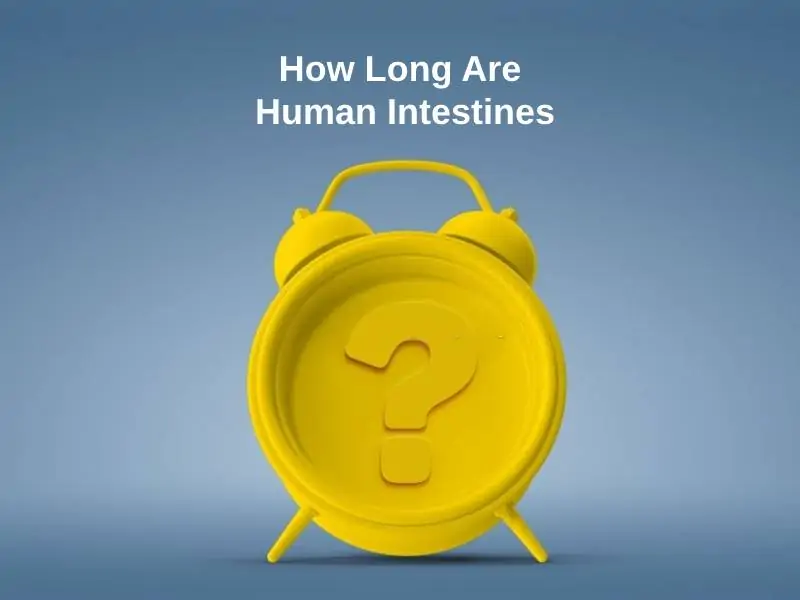Exact Answer: 26 Feet
Human beings need food to stay alive. Food gives them energy. The distribution of energy throughout the body is taken care of by the digestive system. The intestines are part of the digestive system and are equally responsible for the distribution of energy. It has a length of 15 meters. The food takes a lot of time to digest due to the length of the intestines.
The intestines are divided into two parts and it is so long due to both of them joining together. The large intestine is shorter in length than the small intestine but the large intestine has more breadth than the small intestine.

How Long Are Human Intestines?
| Type | Length |
| Large Intestine | 5 Feet |
| Small Intestine | 21 Feet |
The intestines inside the human body are very lengthy. The naming is done after the breadth of both the intestines. So large intestine is more in diameter than the small intestine. The food passes through the small intestine first and then the large intestine. Both the intestines are further divided into different regions due to their lengthy structure.
The small intestine is divided into duodenum, which is 9 inches long, jejunum, which is 8.2 feet long, and ileum which is just above 10 feet. The large intestine is divided into four distinct parts, which are the cecum, colon, rectum, and lastly anal canal. Most of the enzymes are released in the small intestine, in the duodenum portion, and are the shortest in length, while in the jejunum, its walls are responsible for absorbing nutrients from the food. And lastly, the ileum, being the largest portion of the small intestine, absorbs the remaining nutrients and lets the food pass to the large intestine.
The cecum portion of the large intestine acts as a junction, where both the intestines join and its function is mainly to absorb salts. Next is the colon, which is the largest portion of the large intestines that absorbs water. The rectum and anal canal are responsible for feces and bowel movements. Due to such vast functions, the intestines are almost 26 feet in length in an average adult.
Why Are The Human Intestines So Long?
As mentioned above, because of the large number of functions, the intestines are very long. The enzymes released in the intestines, need time to function. But due to the fact it being lengthy, there is not much problem in absorbing the nutrients. The intestines cover more than half of the digestive system. In matters of importance, the small intestine is more important than the large intestine.
The small intestine gives the body the energy which causes it to function. There have been many cases all around the world, where someone’s large intestine is removed and that person can still live. Due to its lengthy structure, it needs to be given extra attention. Diseases like colorectal cancer, Crohn’s disease, Celiac disease, etc. But the most common problem faced by almost every human being is constipation, which is s problem in the large intestine.
Another reason for the intestines being so long is because it is folded inside the stomach and not in a straight path. The folding structure helps in better digestion and absorption of nutrients. The small intestine has more folds than the large intestine. Lastly, the intestines contain hair-like small projections which help in the process. As digestion takes an hour, any kind of hard work should be avoided, as it makes the intestines stretch, which causes problems in the stomach.
The cecum portion of the large intestine acts as a junction, where both the intestines join and its function is mainly to absorb salts. Next is the colon, which is the largest portion of the large intestines that absorbs water. The rectum and anal canal are responsible for feces and bowel movements. Due to such vast functions, the intestines are almost 26 feet in length in an average adult.
Conclusion
The intestines are located below the stomach and are made up of muscles purely. Due to the heavy-duty that is imposed on them, they should be taken care of with lots of healthy food. The large intestine can be removed surgically. When that happens, the small intestines are directly connected to the rectum. Even though it is possible, but nothing should be done without a doctor’s suggestion. But in case of serious conditions like cancer, the large intestine should be detached from the body as a safety measure taken by the doctor, to protect the life of the patient. As a whole, the intestines act as a very important part of the human body.